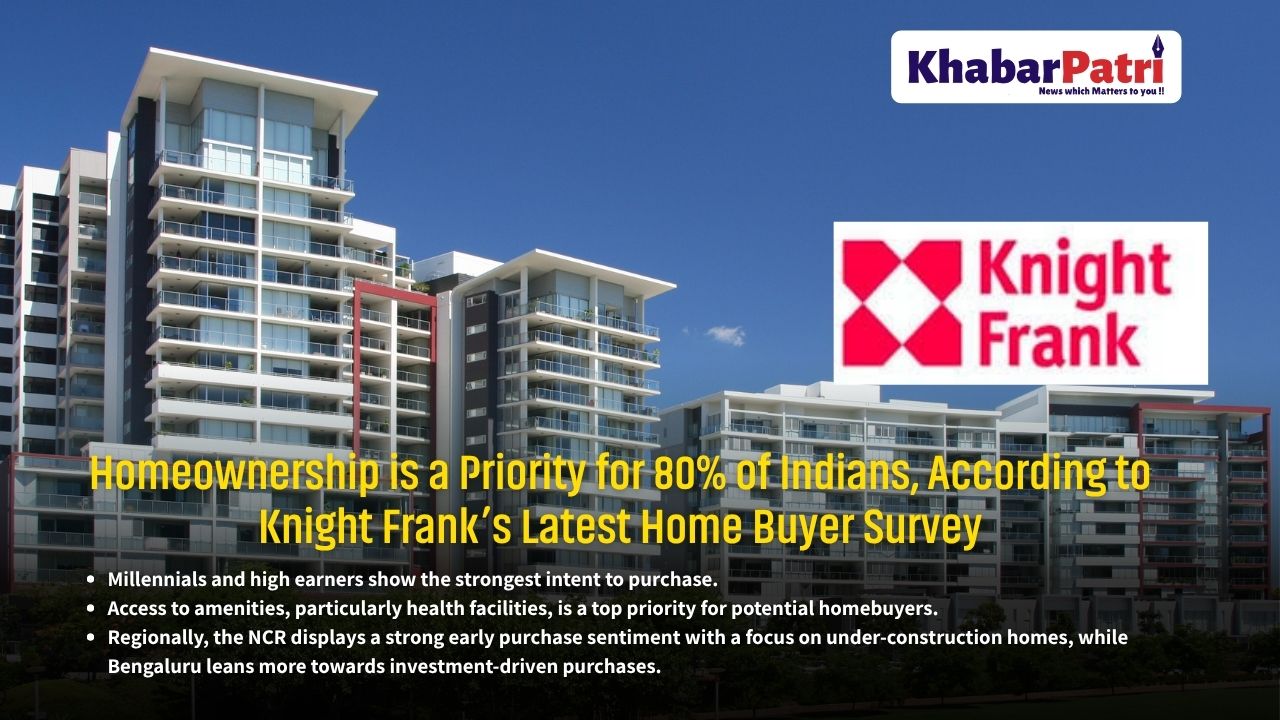-
-
- Millennials and high-income individuals demonstrate the highest intent to buy.
- Access to amenities, especially health facilities, ranks as a top priority for prospective homebuyers.
- Regionally, the NCR exhibits a strong inclination towards early purchases, particularly in under-construction properties, while Bengaluru tends to favor investment-oriented acquisitions.
Ahmedabad: A recent study conducted by Knight Frank, India’s premier real estate consultancy, sought to assess homebuyers’ sentiments. The findings reveal that a significant majority prefer home ownership over alternative options. The report, titled ‘Beyond Bricks: The Pulse of Home Buying,’ shows that 80% of respondents across the nation have positive attitudes toward purchasing a home. It emphasizes that a large portion (80%) of Indians continues to hold strong aspirations for owning a home. This desire is especially evident among high-income earners with annual incomes surpassing INR 5 million (91%) and millennials (82%). A total of 1,629 respondents from the eight major cities across the country were surveyed, offering valuable insights into home buying sentiments in India.

Source: Knight Frank India Shishir Baijal, Chairman and Managing Director, Knight Frank India, said,“Homeownership has emerged as a robust and enduring trend, particularly in the post-pandemic period, resulting in a marked increase in residential demand. This momentum was further supported by proactive measures undertaken by regulatory authorities, including extended reductions in REPO rates and buyer-centric incentives such as stamp duty rebates. Collectively, these factors repositioned homeownership as a symbol of financial security and future stability. Additionally, sustained economic growth has reinforced buyer confidence, contributing to continued resilience and activity within the residential real estate sector.”
Ownership vs Rent : Evaluating a complex interplay of income, generational factors, city-specific dynamics, and evolving buyer motivations, Knight Frank India’s latest report reiterates how home ownership remained a deeply rooted aspiration for Indians across all major markets.
The purchase sentiment was strongest in areas such as Chennai (86%), Ahmedabad (83%), and Mumbai Metropolitan Region (85%), driven by growing disposable wealth, greater financial stability, and cultural sentiments. Other regions, such as Kolkata (80%) and Hyderabad (81%), also demonstrated high ownership preference owing to a desire for long-term security. Two main markets that somewhat lagged in this regard were Delhi-NCR (74%) and Bengaluru (73%), owing to higher property prices and an influx of young, migrant professionals who favoured rental accommodations over ownership.
Demography -wise, the purchase sentiment was pushed most robustly by high earners with annual incomes above INR 5 million (91%) and millennials (82%) due to their higher disposable wealth and better financial security. Respondents from Gen Z (71%) and lower-income groups earning less than INR 1 million annually (72%) had relatively lower homeownership sentiment due to affordability constraints, lifestyle flexibility, and early career mobility. This indicated a growing market demand for accessible financing solutions and entry-level housing options tailored to the unique needs of different consumer demographics.

Source: Knight Frank IndiaNote: Owning is derived by including currently owning and currently renting but planning to buy (latent demand).
Defining Decision-making: The key drivers for home ownership in India
While buyer motivations were shaped by various factors such as economic trends, level of urbanisation, and affordability dynamics across different cities, the Home Buyer Survey highlighted some common trends driving the purchase sentiment. A significant portion of the respondents across the country (37%), for instance, were looking to purchase a home to upgrade to a better living space, while nearly a third (32%) wanted to buy a house for the first time for end-use.
Apartments remained the most preferred residential choice across generations and income groups, though higher-income buyers showed a stronger preference for independent houses and villas, indicating a desire for space, privacy, and premium living.

Source: Knight Frank India The reasons behind home ownership also varied markedly from region to region. A large number of respondents from Bengaluru (40%) and Mumbai Metropolitan Region (34%), for example, wanted to make investment-driven purchases while most prospective buyers from Chennai (51%), Ahmedabad (48%), and Delhi-NCR (42%) were looking to buy their first homes for end-use. This latter trend reflected in the more robust early purchase sentiments in markets such as Delhi-NCR, where homebuyers demonstrated keen interest in under-construction and pre-launch properties, driven by modern amenities, pricing flexibility, and renewed confidence in project delivery.
All about Amenities: Other factors behind home selection : Seamless and easy access to common amenities remained high on the list of priorities for prospective Indian homebuyers. More than half (58%) preferred their new homes to be closer to health facilities, while a similar number (53%) indicated a preference for shopping outlets. Public transport access was also a prominent factor in the decision-making process of most buyers, with 40% of respondents indicating it to be something they sought while selecting a home.
Somewhat surprisingly, features such as fitness centres (16%) and community clubs (23%) ranked much lower in the priority of homebuyers, with most expecting them to be a standard feature in modern housing projects. This indicated a growing shift amongst new-age homebuyers toward more informed and strategic decision-making, balancing financial viability, convenience, and long-term value. Factors like location, affordability, and developer reputation continue to hold significance, while lifestyle amenities and financing options were also noted to be increasingly influential in buyer preferences.
-
Leave a comment

